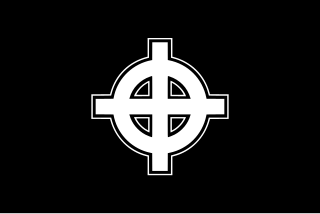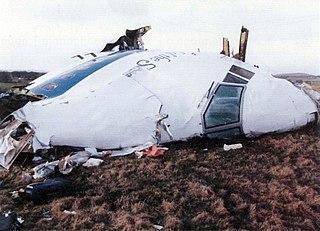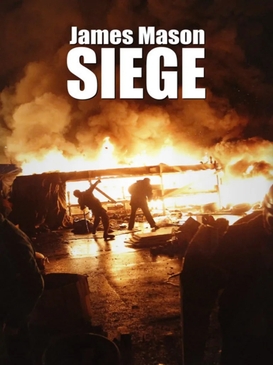Related Research Articles

Terrorism, in its broadest sense, is the use of violence against non-combatants to achieve political or ideological aims. The term is used in this regard primarily to refer to intentional violence during peacetime or in the context of war against non-combatants. There are various different definitions of terrorism, with no universal agreement about it. Different definitions of terrorism emphasize its randomness, its aim to instill fear, and its broader impact beyond its immediate victims.

A hate group is a social group that advocates and practices hatred, hostility, or violence towards members of a race, ethnicity, nation, religion, gender, gender identity, sexual orientation, or any other designated sector of society. According to the United States Federal Bureau of Investigation (FBI), a hate group's "primary purpose is to promote animosity, hostility, and malice against persons belonging to a race, religion, disability, sexual orientation, or ethnicity/national origin which differs from that of the members of the organization."
Christian terrorism, a form of religious terrorism, refers to terrorist acts which are committed by groups or individuals who profess Christian motivations or goals. Christian terrorists justify their violent tactics through their interpretation of the Bible and Christianity, in accordance with their own objectives and worldview.
Mia M. Bloom is a Canadian academic, author, and Professor of Communication at Georgia State University. She was formerly an associate Professor of International Studies at the Pennsylvania State University in University Park and a fellow at the International Center for the Study of Terrorism at Penn State.

In the United States, domestic terrorism is defined as terrorist acts that were carried out within the United States by U.S. citizens and/or U.S. permanent residents. As of 2021, the United States government considers white supremacists to be the top domestic terrorism threat.

Right-wing terrorism, hard right terrorism, extreme right terrorism or far-right terrorism is terrorism that is motivated by a variety of different right-wing and far-right ideologies. It can be motivated by Ultranationalism, neo-Nazism, anti-communism, neo-fascism, ecofascism, ethnonationalism, religious nationalism, anti-immigration, anti-semitism, anti-government sentiment, patriot movements, sovereign citizen beliefs, and occasionally, it can be motivated by opposition to abortion, and homophobia. Modern right-wing terrorism largely emerged in Western Europe in the 1970s, and after the Revolutions of 1989 and the dissolution of the Soviet Union in 1991, it emerged in Eastern Europe and Russia.

Left-wing terrorism or far-left terrorism is terrorism motivated by left-wing or far-left ideologies, committed with the aim of overthrowing current capitalist systems and replacing them with communist or socialist societies. Left-wing terrorism can also occur within already socialist states as criminal action against the current ruling government.
Radicalization is the process by which an individual or a group comes to adopt increasingly radical views in opposition to a political, social, or religious status quo. The ideas of society at large shape the outcomes of radicalization. Radicalization can result in both violent and nonviolent action – academic literature focuses on radicalization into violent extremism (RVE) or radicalisation leading to acts of terrorism. Multiple separate pathways can promote the process of radicalization, which can be independent but are usually mutually reinforcing.

Terrorism in the United Kingdom, according to the Home Office, poses a significant threat to the state. There have been various causes of terrorism in the UK. Before the 2000s, most attacks were linked to the Northern Ireland conflict. In the late 20th century there were also attacks by Islamic terrorist groups. Since 1970, there have been at least 3,395 terrorist-related deaths in the UK, the highest in western Europe. The vast majority of the deaths were linked to the Northern Ireland conflict and happened in Northern Ireland. In mainland Great Britain, there were 430 terrorist-related deaths between 1971 and 2001. Of these, 125 deaths were linked to the Northern Ireland conflict, and 305 deaths were linked to other causes, including 270 in the Lockerbie bombing. Since 2001, there have been almost 100 terrorist-related deaths in Great Britain.

Jeffrey Kaplan is an American academic who has written and edited a number of books on racism, religious violence, terrorism and the far-right. He is an associate professor of religion at the University of Wisconsin–Oshkosh and a member of the board of academic advisors of the university's Institute for the Study of Religion, Violence and Memory.
Jytte Klausen is a Danish-born scholar of politics who teaches at Brandeis University in Waltham, Massachusetts as the Lawrence A. Wien Professor of International Cooperation in the Department of Politics. Klausen has also served as an affiliate at the Minda de Gunzburg Center for European Studies at Harvard, among other positions.
Maxwell "Max" Taylor is a criminal and legal psychologist. His early work specialised in the study of terrorism but he also became involved in the study of sex offenders, and in the development of capacity building activities for disadvantaged children in conflict zones, returning later to the study of terrorism.

There is a long history of terrorism in Europe. This has often been linked to nationalist and separatist movements, while other acts have been related to politics, religious extremism, or organized crime. Terrorism in the European sections of the intercontinental countries of Turkey and Russia are not included in this list.

Siege is an anthology of essays first published as a single volume in 1992, written in 1980s by James Mason, a neo-Nazi and associate of the cult leader Charles Manson. After growing disillusioned with the mass movement approach of neo-Nazi movements, he began advocating for white revolution through terrorism. Referred to as the "Godfather of Fascist Terrorism", Mason has been proscribed as a "terrorist entity" in Canada.” Mason originally wrote the essays for the eponymous newsletter of the National Socialist Liberation Front, a militant splinter of the American Nazi Party.

Domestic terrorism or homegrown terrorism is a form of terrorism in which victims "within a country are targeted by a perpetrator with the same citizenship" as the victims. There are various different definitions of terrorism, with no universal agreement about it.
The Norwegian Front was a neo-fascist extraparliamentary political party in Norway founded in 1975, led by Erik Blücher as fører. Following a bomb attack by an activist from the party, the NF was dissolved in 1979 and succeeded by the National People's Party, which itself was dissolved in 1991 after several leading members had received long prison sentences following another bomb attack. The NF had around 1,400 members at its peak.
Incel is a term associated with an online subculture of people who define themselves as unable to find a romantic or sexual partner despite desiring one, and blame, objectify and denigrate women and girls as a result. The movement is strongly linked to misogyny. Originally coined as "invcel" around 1997 by a queer Canadian female student known as Alana, the spelling had shifted to "incel" by 1999, and the term later rose to prominence in the 2010s, following the influence of misogynistic terrorists Elliot Rodger and Alek Minassian.
A misogynist terrorist attack in a Toronto erotic spa took place on 24 February 2020.

Misogynist terrorism is terrorism that is motivated by the desire to punish women. It is an extreme form of misogyny—the policing of women's compliance to patriarchal gender expectations. Misogynist terrorism uses mass indiscriminate violence in an attempt to avenge nonconformity with those expectations or to reinforce the perceived superiority of men.
Far-right terrorism in Australia refers to far-right-ideologically influenced terrorism on Australian soil. Far-right extremist groups have existed in Australia since the early 20th century, however the intensity of terrorist activities have oscillated until the present time. A surge of neo-Nazism based terrorism occurred in Australia during the 1960s and the 1970s, carried out primarily by members of the Ustaše organisation. However in the 21st century, a rise in jihadism, the White genocide conspiracy theory, and after effects of the COVID-19 pandemic have fuelled far-right terrorism in Australia. Both the Australian Security Intelligence Organisation (ASIO) and the Australian Federal Police (AFP) are responsible for responding to far-right terrorist threats in Australia.
References
- 1 2 3 4 5 6 "John Horgan". College of Arts & Sciences. Georgia State University. 20 August 2019. Retrieved 25 May 2020.
- ↑ Horgan, John (20 November 2018). "An Interview with Dr. John Horgan – Terrorism, Psychology, and Major Issues in the Field" (Interview).
- 1 2 3 Reetz, Noelle Toumey (26 June 2019). "Grant Will Fund Research into Growing Male Supremacist Subculture Online". Georgia State University News. Retrieved 25 May 2020.
- 1 2 Culver, Jordan (21 May 2020). "A Canadian teenager has been charged with terrorism inspired by the online 'incel' movement. What is an 'incel?'". USA Today . Retrieved 25 May 2020.
- ↑ "John Horgan on Islamic Terrorism on TV3 Tonight at 10pm". The Maine Valley Post. 12 October 2015. Retrieved 25 May 2020.
- ↑ Shane, Scott (25 June 2015). "Homegrown Extremists Tied to Deadlier Toll Than Jihadists in U.S. Since 9/11". The New York Times. Retrieved 25 May 2020.
- 1 2 3 "Director of Penn State's ICST appointed member of FBI board". Penn State News. 3 June 2010. Retrieved 25 May 2020.
- ↑ "Terrorism expert to head Intl. Center for the Study of Terrorism". Penn State News. 9 September 2008. Retrieved 25 May 2020.[ permanent dead link ]
- ↑ Horgan, John G. (2 March 2015). "Can Science Solve Terrorism? Q&A with Psychologist John Horgan" (Interview). Interviewed by John Horgan. Scientific American.
- ↑ "Walking Away from Terrorism: Accounts of Disengagement from Radical and Extremist Movements". Airey Neave Trust. Archived from the original on 21 July 2020. Retrieved 25 May 2020.
- 1 2 "John Horgan". Google Scholar Citations. Retrieved 25 May 2020.
- ↑ "Studies in Conflict & Terrorism Editorial Board". Taylor & Francis. Retrieved 25 May 2020.
- ↑ "Editorial Board". Journal of Strategic Security. University of South Florida Tampa Library. Retrieved 25 May 2020.
- ↑ "Legal and Criminological Psychology Editorial Board". Wiley Online Library. Retrieved 25 May 2020.